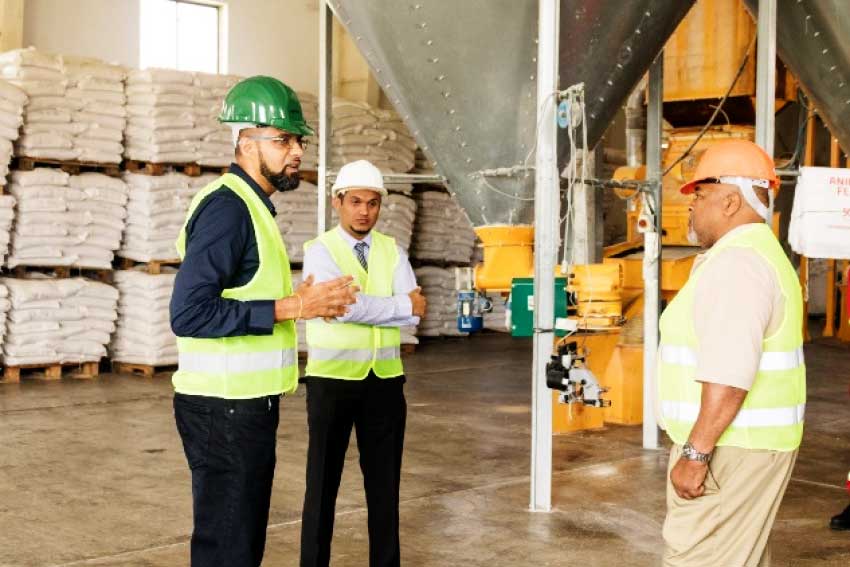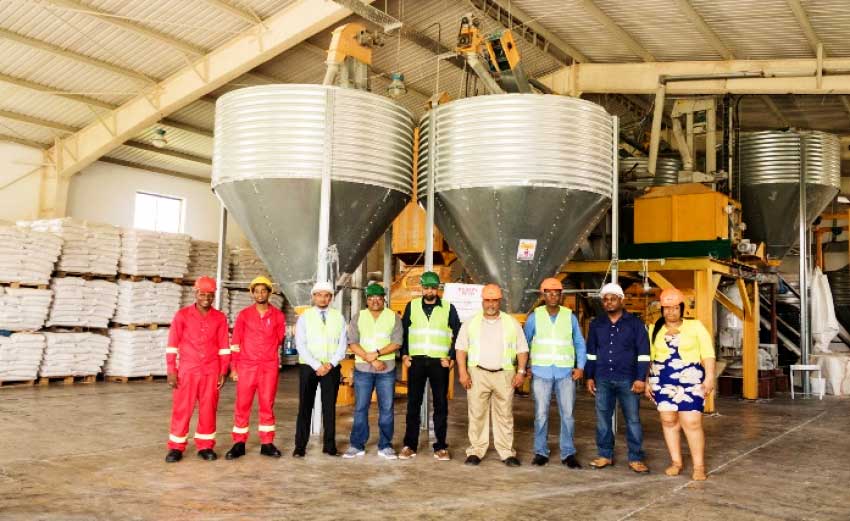PRESS RELEASE – LAST Saturday, 13th October 2018, preceding World Food Day celebrations in Saint Lucia at Fond D’Or and the official World Food Day celebrations across the globe, a contingent of government officials from The Commonwealth of Dominica were treated to an extensive tour of the Caribbean Grains Feed Mill Facility in the free zone, and the Flour Mill Facility at the seaport in Vieux Fort.
The touring team comprised Mr. Reginald Austrie Deputy Prime Minister and Minister of Agriculture, Dominica, Dr Reginald Thomas Permanent Secretary of Agriculture, Dominica, Mr. Titus Preville, Permanent Secretary in the Ministry of Commerce of Saint Lucia; the visitors were hosted by Mr. Ravi Ramadhar, Director of Business Development and Mr. Tariq Khan, Director of Feed Mill Operations of Caribbean Grains St. Lucia.

Caribbean Grains Ltd. owns the sole livestock feed milling operation in Saint Lucia; established four years ago with the capacity to manufacture a full range of livestock feed for the domestic and regional export markets.
Currently, Caribbean Grains Ltd (CGL) products are available from Saint Lucia for export to Dominica, Barbados, St. Vincent and Antigua.
The company has successfully developed quality products aimed at alleviating the challenges faced by the farmers as it relates to livestock nutrition management, and continues the implementation of industry best practise for increasing production yield.
Caribbean Grains Ltd. and its subsidiary companies in the region view the development of the downstream activities in the agricultural sector and the food and beverage industry (bakeries, caterers, farms, abattoir etc) as quintessential in their strategic mandate for the development of the host country.
The company works arduously to maintain its rates, reduce economic strain on the government and supports the local distributors and end users throughout its extensive sustainable programmes.
The Deputy Prime Minister of Dominica expressed his first impression of the facilities as ‘functional, well-equipped and innovative’.
The country’s interest in Caribbean Grains includes the development the entire value chain of the poultry and pig industry in Dominica.
He further reinforced the need to partner with entities which can grow Dominica’s agricultural sector and promote resilient solutions needed to withstand natural catastrophes.
The closeness of Saint Lucia and Dominica also bodes well with the interconnectedness of the nations and the support systems already in place.

Crucial deciding factors for partnering with Caribbean Grains Ltd is the company’s strength in shipping, adherence to European health standards and the successful implementation of similar developmental programs in other OECS states.
For the team, the most essential takeaways from their first-hand view of the feed mill facility, was the education provided to the farmers and the widespread manner in which the operation yielded gains for everyone in the supply chain; the feed has “No Antibiotics, No Hormones, and No Animal by products”.
According to Mr. Ramadhar, ‘We are very happy with the welcoming environment in the region and as a result, have engaged in extensive research before entering the market. We know challenges are still ahead as the market develops and evolves, however, we are confident that the sustained measures we have put in place to keep all our key stakeholders abreast of our programmes and initiatives, will greatly assist in fostering a mutually beneficial relationship.
“CGL shares in the vision of the OECS mandates to reduce the food import bill, and increase food security for the region.’
The company, together with other stakeholders, has placed a spotlight on the development of the region, and believes it is pertinent to continue in this vein.
For Mr. Khan, ‘an important aspect to the company is the feed mill’s ability to engage local farmers through open dialogue and support mechanisms to promote our antibiotic free feeds, and how they can be used effectively to gain higher yields in their production thus ensuring the economic viability of their livelihood.’





![Simón Bolívar - Liberator of the Americas [Photo credit: Venezuelan Embassy]](https://thevoiceslu.com/wp-content/uploads/2025/12/Simon-Bolivar-feat-2-380x250.jpg)



